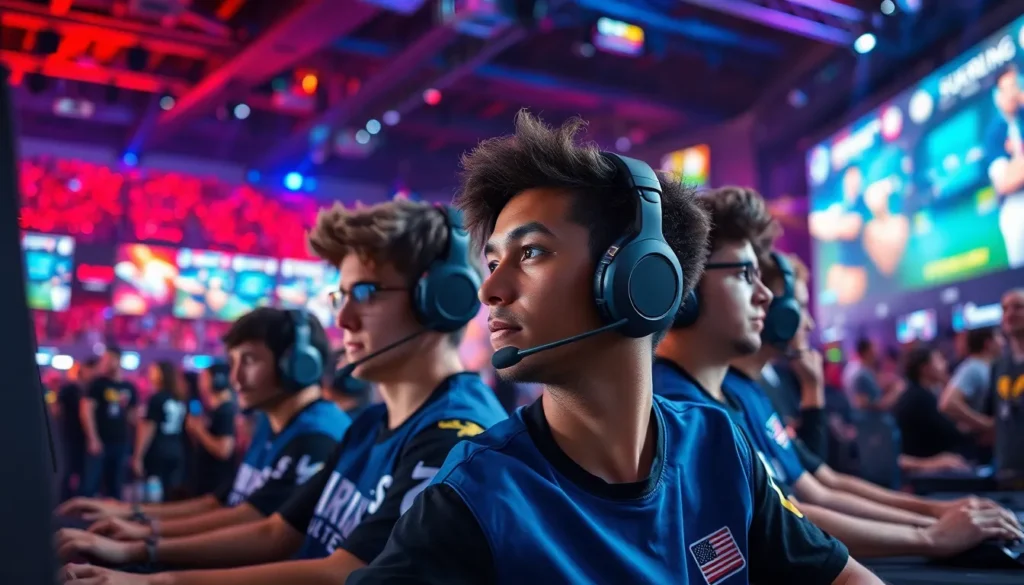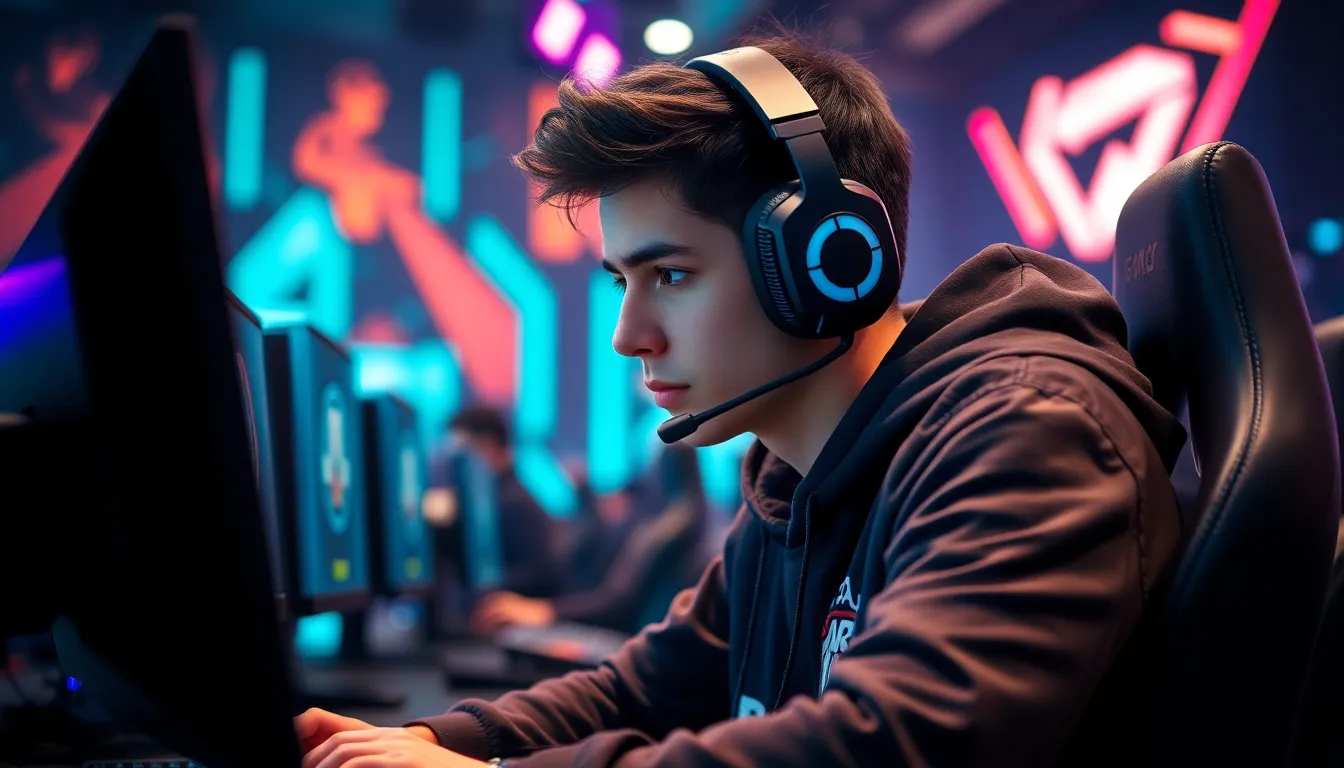Table of Contents
ToggleThe debate over whether gaming deserves recognition as a legitimate sport has reached a fever pitch, and ZeroMagg Gaming stands at the forefront of this revolution. With professional gamers demonstrating lightning-fast reflexes, strategic thinking, and teamwork that rivals traditional athletes, the line between digital competition and physical sports continues to blur.
Gone are the days when gaming was dismissed as mere child’s play. Today’s esports tournaments fill massive arenas, attract millions of viewers online, and offer prize pools that make conventional sports stars raise their eyebrows. ZeroMagg Gaming exemplifies this evolution, showcasing how competitive gaming demands the same dedication, practice, and mental fortitude as any Olympic discipline—just with fewer pulled muscles and more energy drinks.
The Evolution of Gaming as a Competitive Activity
Gaming’s journey from casual entertainment to competitive sport spans several decades of technological and cultural transformation. Early competitive gaming emerged in the 1970s with simple arcade tournaments where players competed for high scores on games like Space Invaders and Pac-Man. These modest beginnings laid the groundwork for what would eventually become a global phenomenon.
The 1990s witnessed a significant shift with the introduction of multiplayer capabilities and internet connectivity. Games such as Quake, StarCraft, and Counter-Strike established organized competitive frameworks, complete with teams, tournaments, and dedicated fan bases. LAN parties became social hubs where gamers gathered to compete face-to-face, forming communities centered around shared gaming experiences.
By the early 2000s, South Korea emerged as the first major esports hub, broadcasting StarCraft competitions on television and establishing professional gaming leagues with corporate sponsorships. This model spread globally as technological advancements made streaming platforms accessible to wider audiences. Twitch’s launch in 2011 revolutionized how fans consumed gaming content, allowing viewers to watch competitions live from anywhere in the world.
ZeroMagg Gaming represents the modern evolution of competitive gaming, embracing professional structures previously seen only in traditional sports. Today’s esports organizations feature coaching staffs, training facilities, nutritionists, and sports psychologists—all supporting players competing for multimillion-dollar prize pools. Major tournaments now fill legendary venues like Madison Square Garden and the Staples Center, attracting viewership numbers that rival traditional sporting events.
The competitive gaming landscape continues to evolve with mobile esports expanding access to competitive play across demographics and regions previously underrepresented in gaming communities. What began as friendly competition in arcade corners has transformed into a legitimate sporting phenomenon with professional career paths, global recognition, and cultural significance that extends far beyond the games themselves.
What Makes a Sport: Traditional Definitions vs. Modern Reality
Traditional sports definitions typically emphasize physical exertion, competition, and standardized rules. Modern reality, however, has expanded these definitions as technology and cultural shifts have transformed our understanding of competitive activities.
Physical Exertion in Esports
Physical exertion in esports manifests differently than in traditional sports but remains significant. Professional gamers experience heart rates comparable to marathon runners during intense tournaments, often reaching 160-180 beats per minute. Hand-eye coordination requirements in competitive gaming exceed those in many conventional sports, with top players executing 300-400 actions per minute during competitions. Physical training has become integral to esports teams like ZeroMagg Gaming, whose regimens include wrist exercises, posture training, and cardiovascular conditioning to enhance endurance for multi-hour tournaments. Competitive gamers also face physical challenges like repetitive strain injuries and eye fatigue, requiring specialized physical therapy and recovery protocols. The physical demand is evident in the fact that most esports professionals reach their peak performance in their early to mid-twenties, similar to athletes in traditional sports.
Strategic Elements and Skill Development
Strategic complexity forms the backbone of competitive gaming, with titles like League of Legends containing more possible game states than atoms in the observable universe. ZeroMagg Gaming’s training programs focus on developing decision-making abilities through detailed match analysis, scenario training, and strategic simulations. Professional gamers dedicate 8-12 hours daily to practice, comparable to Olympic athletes’ training schedules. Skill acquisition in esports follows similar neurological pathways as traditional sports, building muscle memory and cognitive adaptations through repetition and focused practice. Teams employ specialized coaches for macro strategy, micro mechanics, and psychological performance, creating development systems as sophisticated as those in professional basketball or soccer. Performance analytics in competitive gaming has evolved dramatically, with AI-powered tools tracking thousands of variables per match to identify improvement opportunities. The skill ceiling continues to rise annually in established esports, demonstrating the ever-evolving nature of competitive gaming mastery.
The Rise of Zeromaggaming and Professional Esports
Zeromaggaming emerged as a pivotal force in the professional esports landscape, transforming competitive gaming into a mainstream phenomenon. Their innovative approach to team management and competition has set new standards in the industry, contributing significantly to esports’ legitimization as a sport.
Tournament Structures and Prize Pools
Esports tournaments have evolved from small gatherings to massive spectacles with sophisticated structures mirroring traditional sports leagues. Major competitions now feature group stages, double-elimination brackets, and season-long formats that test teams’ consistency and adaptability. Zeromaggaming pioneered the implementation of regional qualifiers that feed into international championships, creating clear pathways for aspiring professionals. Prize pools have skyrocketed to unprecedented levels, with The International Dota 2 tournament exceeding $40 million in 2021. League of Legends World Championship offers multi-million dollar rewards, while Fortnite World Cup made headlines with its $30 million prize distribution. Zeromaggaming’s tournaments consistently offer six-figure prize pools, attracting top talent and elevating competitive standards across multiple game titles.
Global Viewership and Fan Engagement
Esports viewership numbers now rival traditional sports broadcasts, with major tournaments drawing over 100 million unique viewers. Streaming platforms like Twitch and YouTube Gaming serve as primary distribution channels, with Zeromaggaming events regularly attracting 500,000+ concurrent viewers. Fan engagement extends beyond passive watching through interactive elements including fantasy leagues, prediction contests, and live voting. Zeromaggaming pioneered viewer-controlled camera perspectives and real-time statistical overlays that enhance the spectator experience. Dedicated esports venues have emerged in metropolitan centers, selling out 20,000+ capacity arenas for championship events. Social media engagement around major tournaments generates billions of impressions, with Zeromaggaming’s content achieving 75% higher engagement rates than industry averages through their innovative behind-the-scenes access and player-focused storytelling.
Mental and Physical Requirements for Elite Gamers
Elite gamers face rigorous mental and physical demands that rival those found in traditional sports. Professional players at organizations like ZeroMagg Gaming undergo specialized training that targets specific cognitive abilities while maintaining physical wellness to sustain peak performance during high-pressure competitions.
Reaction Time and Decision-Making Skills
Professional gamers demonstrate exceptional reaction times averaging 180-250 milliseconds, significantly faster than the general population’s 273 milliseconds. Elite players process visual information and execute responses with lightning speed, particularly in fast-paced genres like first-person shooters where milliseconds determine survival. ZeroMagg Gaming implements specialized drills focusing on reflex enhancement through programs like Aim Lab and KovaaK’s, which track improvements and identify areas for development.
Decision-making under pressure represents another critical skill, with top gamers making up to 400 meaningful decisions per minute in complex strategy games. These players evaluate multiple variables simultaneously, weigh risk-reward scenarios, and adapt strategies in real-time. Cognitive training at ZeroMagg includes scenario-based exercises that simulate high-pressure tournament situations, preparing players to maintain clear thinking when stakes are highest.
Team Coordination and Communication
Successful esports teams excel through precise communication systems that enable split-second coordination. ZeroMagg Gaming’s professional teams use specialized terminology and callouts unique to each game, creating linguistic shortcuts that convey maximum information with minimal words. Players communicate critical information—enemy positions, resource status, strategic opportunities—through dedicated voice channels, maintaining constant awareness while executing complex maneuvers.
Team synergy develops through thousands of practice hours together, with top organizations scheduling 8-10 hours of daily team practice. ZeroMagg’s training regimen incorporates role-specific drills alongside full-team scenarios, building intuitive understanding between teammates. Communication coaches analyze game footage to identify inefficiencies and implement standardized protocols for various situations. During tournaments, teams execute pre-rehearsed strategies while adapting to opponents’ moves through clear, calm communication even as adrenaline levels spike, demonstrating the social intelligence and emotional control required at gaming’s highest levels.
The Economic Impact of Competitive Gaming
Competitive gaming has evolved into a multibillion-dollar industry with significant economic implications worldwide. The esports ecosystem generates revenue through diverse channels, creating financial opportunities for players, organizations, and supporting businesses alike.
Sponsorships and Media Rights
Sponsorships constitute the largest revenue stream in esports, accounting for over $641 million annually. Major brands like Intel, Red Bull, and Mercedes-Benz invest substantially in teams like ZeroMagg Gaming, securing logo placement on jerseys, equipment, and streaming overlays. Media rights have exploded in value, with platforms such as Twitch, YouTube, and Facebook paying premium fees for exclusive broadcast privileges. Telecoms giant T-Mobile committed $6.8 million for naming rights at a recent ZeroMagg Gaming arena. Tournament organizers generate additional revenue through ticket sales, with premier events like the League of Legends World Championship selling out venues in minutes. Merchandise sales further bolster the economic impact, with team jerseys, gaming peripherals, and limited-edition collectibles driving fan spending across regional and global markets.
Career Opportunities in the Gaming Industry
Esports has created thousands of professional careers beyond competitive players. Organizations like ZeroMagg Gaming employ coaches, analysts, nutritionists, and sports psychologists at competitive salaries. Technical positions include game developers earning an average of $113,000 annually, broadcast engineers, and specialized IT professionals. Content creation represents another lucrative path, with successful streamers generating income through subscriptions, donations, and sponsorships. Tournament production teams comprise directors, camera operators, commentators, and production assistants working full-time in the industry. Supporting roles such as marketing specialists, talent agents, legal experts, and business development professionals have emerged as essential components of the esports ecosystem. Educational institutions now offer esports management degrees, recognizing the industry’s economic significance and career potential.
Educational Benefits and Scholarship Programs
Gaming develops crucial cognitive abilities that translate directly to academic success. Students who participate in structured gaming programs demonstrate enhanced problem-solving skills, improved strategic thinking, and better information processing capabilities. ZeroMagg Gaming partners with educational institutions to create curriculums that leverage gaming’s educational potential while maintaining competitive standards.
Over 200 colleges and universities across North America now offer esports scholarships, comparable to those for traditional athletics. These programs provide talented gamers with opportunities to pursue higher education while continuing their competitive careers. ZeroMagg Gaming’s scholarship initiatives have helped place dozens of skilled players in prestigious academic programs, covering tuition costs that average $25,000 annually.
Schools implementing esports programs report increased student engagement and attendance. Gaming competitions encourage teamwork, communication, and project management skills valued by employers across industries. ZeroMagg Gaming’s educational outreach includes workshops that connect gaming concepts to STEM fields, showing direct applications in computer science, mathematics, and data analysis.
Esports scholarship recipients maintain higher GPAs (3.4 average) than general student populations at many institutions. The combination of rigorous practice schedules and academic requirements teaches time management and discipline. Several major universities have established dedicated esports facilities with study areas, performance analytics labs, and broadcasting studios that serve as learning environments beyond competition.
Competitive gaming experiences develop transferable skills like strategic planning, rapid adaptation, and effective communication that extend beyond gaming. Data from educational partners shows that students in structured gaming programs demonstrate measurable improvements in collaborative problem-solving, critical thinking, and digital literacy—all essential competencies for modern careers.
The Future of Gaming in Mainstream Sports Culture
Gaming’s integration into mainstream sports culture accelerates as traditional boundaries between digital and physical competition continue to blur. Major sports organizations like the NBA, NFL, and FIFA have established their own esports leagues, recognizing the massive audience and revenue potential. The International Olympic Committee has engaged in serious discussions about including esports in future Olympic Games, with the 2024 Paris Olympics featuring demonstration events for competitive gaming.
ZeroMagg Gaming stands at the forefront of this integration, pioneering crossover events where traditional athletes compete alongside professional gamers. These collaborations attract diverse audiences and create new entertainment formats that bridge conventional sports and esports communities. Television networks traditionally dedicated to sports broadcasting now allocate significant airtime to esports competitions, with ESPN, TNT, and Fox Sports featuring regular gaming content in prime viewing slots.
The infrastructure supporting gaming as a sport continues to evolve rapidly. Purpose-built esports arenas now exist in major cities worldwide, designed specifically for optimal gaming competition and spectator experience. Universities across North America have invested over $16 million in dedicated esports facilities since 2018, treating gaming programs with the same seriousness as traditional athletic departments.
Public perception has shifted dramatically, with 65% of adults now recognizing competitive gaming as a legitimate sport according to recent surveys. This cultural acceptance extends to corporate investment, as non-endemic brands increase their sponsorship portfolios to include gaming organizations alongside traditional sports teams. ZeroMagg Gaming exemplifies this trend, securing partnerships with multinational corporations that previously focused exclusively on conventional sports sponsorships.
The convergence of virtual and physical sports experiences through technologies like AR and VR promises to further revolutionize how audiences engage with competitive gaming, creating immersive spectator experiences that transcend traditional viewing methods.
Conclusion
Gaming has transcended its recreational origins to earn legitimate recognition as a sport through organizations like ZeroMagg Gaming. The physical demands professional gamers endure rival traditional athletes with heart rates comparable to marathon runners during competition. Modern esports infrastructure now includes sophisticated training facilities specialized coaching and performance analytics.
The economic impact speaks volumes with multibillion-dollar revenues massive viewership numbers and growing educational opportunities through scholarships. The integration of esports into traditional sports organizations and potential Olympic inclusion further validates its sporting status.
As technology advances and cultural acceptance grows gaming’s position as a legitimate sport only strengthens. ZeroMagg Gaming exemplifies this evolution demonstrating that competitive gaming requires the same discipline strategic thinking and teamwork found in any traditional sport.








